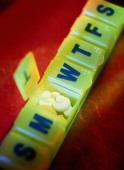
SATURDAY, Dec. 8 (HealthDay News) — The new anti-clotting drug apixaban (Eliquis) appears to help prevent potentially fatal blood clots in patients with deep vein thrombosis (DVT), a new Italian study finds.
People who suffer from venous thromboembolism are prone to develop blood clots in the veins in their legs (DVT). If a clot breaks loose, it can travel to the heart and cause a heart attack, or the brain and cause a stroke, or to the lungs and cause severe breathing difficulties, and even death.
“This finding is great,” said Dr. Maja Zaric, an interventional cardiologist at Lenox Hill Hospital in New York City.
Currently, patients with recurrent venous thromboembolism take a drug called warfarin, which is effective but needs careful monitoring and is associated with a risk of major, and sometimes fatal, bleeding.
This drug and others will likely replace warfarin over the next few years, Zaric said. These drugs do not require weekly or monthly blood tests, which is a major problem for many patients, she explained.
“One drawback of apixaban is having to take two doses a day,” Zaric said. “This can make patient compliance less effective. The drug that will be the one most used is the cheapest one that only has to be taken once a day.”
Although apixaban and other drugs in its class cost more initially, not having to make frequent doctor visits to check medication levels along with not having as many severe bleeding episodes as with warfarin will save more in the long run, Zaric pointed out.
“It’s cheaper to spend a little more on a drug than a lot on doctor’s visits and hospitalizations,” Zaric said.
A month’s treatment with warfarin costs about $35 in Canada, where apixaban is available with a monthly price tag of $290, according to the Canadian drug index of Rx List.
The findings were published online Dec. 8 in the New England Journal of Medicine, to coincide with a planned presentation at the American Society of Hematology annual meeting in Atlanta.
Dr. Giancarlo Agnelli, director of the department of internal and cardiovascular medicine and stroke unit at Perugia University Hospital in Italy, and his colleagues randomly assigned almost 2,500 patients to one of three regimens for a year.
Patients were either given 2.5 milligrams (mg) of apixaban twice daily, 5 mg of apixaban twice daily or an inactive placebo. Over the course of the trial, the researchers looked for recurrent venous thromboembolism, deaths from venous thromboembolism or cardiovascular problems and major bleeding.
The investigators found that either dose of apixaban reduced the risk of recurrent venous thromboembolism and venous thromboembolism-related death by about 80 percent, compared with placebo.
While almost 9 percent of those receiving placebo had one of these events, only 1.7 percent of those taking apixaban did, the researchers reported.
In addition, either dose of apixaban reduced the risk of stroke, heart attack and cardiovascular-related death. Major bleeding was similar for those taking apixaban and those receiving placebo, the researchers noted.
“These results indicate that apixaban — at both low and high doses — provides an attractive risk-benefit profile for use as an ongoing treatment option in patients at risk of recurrent [venous thromboembolism],” Agnelli said in a statement.
“This regimen has the potential to eliminate many of the challenges we face when we treat patients with warfarin — including drug and food interactions and the need for ongoing monitoring — which can greatly simplify ongoing management of this condition,” he added.
The trial was funded by the developers of apixaban, Bristol-Myers Squibb and Pfizer. Although the drug has not yet been approved by the U.S. Food and Drug Administration, a decision is expected in March, according to the agency. Approval was delayed because the FDA asked for more data.
Drugs similar to apixaban include Xarelto (rivaroxaban) and Pradaxa (dabigatran etexilate), both of which have been approved by the FDA.
According to the U.S. Centers for Disease Control and Prevention, about one-third of patients who have suffered venous thromboembolism have a recurrence within 10 years.
Another expert, Dr. Gregg Fonarow, a professor of cardiology at the University of California, Los Angeles, said that “after venous thromboembolism, it is recommended that patients be treated with anticoagulation therapy for six to 12 months. However, the benefits and risks of extended treatment with new oral anticoagulant agents are unclear. Given the highly favorable benefit/risk ratio, the extended treatment approach may represent an important therapeutic advance.”
More information
For more information on venous thromboembolism , visit the U.S. National Library of Medicine.

